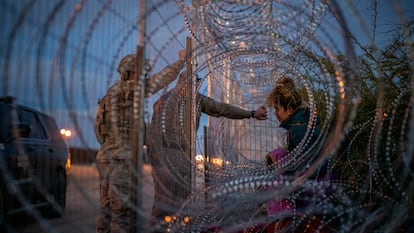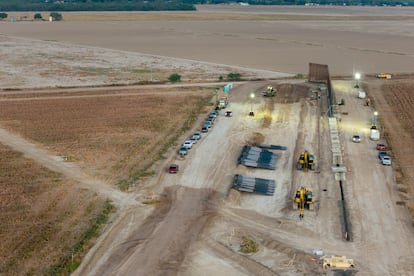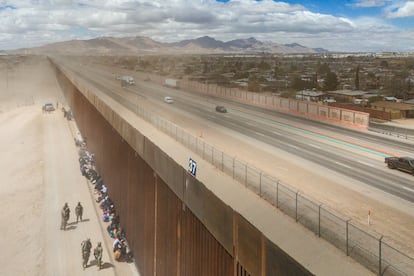Donald Trump’s term has already begun in Texas
The Republican state is implementing policies straight out of the president-elect’s playbook and is emerging as a key ally of the incoming federal government, especially for the mass deportation plan

Building sections of wall on the border, installing barbed wire buoys on the Rio Grande, preparing the ground for building mass detention centers for migrants destined for deportation, or threatening to cut off funding to hospitals if they do not cooperate in providing immigration information on patients. Texas is applying aggressive policies on the border and in the rest of the territory, in addition to offering itself as a key ally in the campaign of mass expulsions of undocumented immigrants, while Tom Homan, the “border czar” installed by the new federal administration, assures that the state is “a model we can take across the country, with unprecedented success.” There is a still a month and a half remaining until Donald Trump becomes president of the United States for the second time, but in the great Republican state his mandate has already begun.
Making the border as impenetrable a barrier as possible is a cornerstone of the Texas model. In recent weeks, Greg Abbott’s state government has installed new buoys on the river that separates the United States and Mexico near Eagle Pass, one of the ground zeroes of the migrant crisis in recent years. The huge orange buoys, equipped with spikes, have generated numerous headlines since the first ones were installed in 2023. A judge first ordered them removed, declaring them illegal, but in September of this year an appeals court reversed that decision, allowing the buoys to return. And since two weeks ago, their expansion.
The new section, about 300 meters long, was barely above water for a few days due to problems with the anchoring system. But now it is back in the river, and with the buoys come concerns. On the one hand, for the lives of migrants who, in their desperation, might venture into the water and challenge the spikes that menacingly adorn the orange balls. In August of last year, two bodies were found floating near the buoys and human rights groups have repeatedly denounced their deployment.

But there is also an environmental concern. There are no studies of the impact of the buoys on the river flow or flora and fauna, but in the time since the first ones were installed, a decrease in water levels where they have been laid has been noted, as well as increased erosion, which could lead to the creation of islands in the middle of the river. An accumulation of organic material has also been seen beneath them, which can affect the movement of fish that live in the river.
Beyond the waters of the border river, razor wire is also a mainstay in Eagle Pass. Last week, another appeals court sided with Texas over the federal government in yet another case after Border Patrol agents, under national rather than state jurisdiction, destroyed sections of wire that Texas had installed in the area. By September, when Texas Attorney General Ken Paxton sued the Biden administration for cutting the wire, the state had put up more than 29 miles of it and is now seeking even more. “It was shocking to me that the federal government would go out of their way to cut razor wire to allow illegals to cross when we’re just trying to protect our own land,” Paxton said after the ruling. “This wasn’t their land. This was our land, our private property. It had nothing due to the federal government. So this is a good win for Texas, a good win for the country, that this court recognized our ability to protect our land.”

Since only four states have a land border with Mexico, the case connecting Gov. Abbott to a Houston doctor and hospital may be more illustrative of what could begin to become national policy. A new executive order went into effect on November 1 requiring Texas hospitals to ask patients if they are U.S. citizens. The question now appears on admission forms at hospitals across the state. Dr. Tony Pastor, a cardiologist at Texas Children’s Hospital, posted a TikTok video on November 11 telling patients they were not legally required to answer the question. The video went viral, garnering more than a million views. In response, the Republican governor threatened last week to pull state funding from the hospital. “Hey Texas Children’s Hospital & Baylor College of Medicine this doctor is putting your Medicaid & Medicare funding at risk,” Abbott wrote on X. “You better think twice & have crystal clear records,” he added. “There will be consequences for failing to follow the law in the Order.”
@goodvibes1146 You are not required to answer those questions.
♬ original sound - Goodvibes
The big concern is that the question will cause people to choose not to seek medical care for fear of being deported. The San Antonio Metropolitan Health District has published a pamphlet informing patients that they do not have to inform the hospital of their immigration status. “You do not have to answer the citizenship question if you don’t want to. Your answer will not affect your care — you will not be turned away,” the flyer states. “You have a right to life-saving care, regardless of citizenship or immigration status.”
But the governor’s threats loom larger. Texas Children’s Hospital intends to comply with the law, according to a statement issued after Abbott’s own message. “Texas Children’s fully supports Governor Abbott’s new Executive Order and is in full compliance,” the statement said. “We have worked closely with the Texas Hospital Association and our industry partners across the state to ensure compliance in advance of the effective date. While we recognize that individuals working at Texas Children’s hold their own personal views on many topics, those opinions do not necessarily reflect the official position of Texas Children’s Hospital. We will continue to prioritize patient care while ensuring we are in full compliance with all laws and legal directives.” This interaction highlights the ways in which the administration of the president-elect will seek to intimidate local authorities, particularly sanctuary cities, with economic and even criminal threats.
And all this is happening as Texas offers itself up as a base of operations for mass deportations. After state land commissioner Dawn Buckingham made a massive ranch on the border available to the incoming administration two weeks ago for the plan to expel millions of undocumented immigrants, the offer has expanded. Buckingham announced the state’s additional support as she stood with the mother and grandmother of 12-year-old Jocelyn Nungaray, who was murdered earlier this year in Houston, allegedly by two members of a Venezuelan criminal gang who entered the country illegally. “The new project that GLO [Texas General Land Office] is going to embark on that I have created is the Jocelyn Initiative,” said Buckingham. “In which we will locate appropriate land under my jurisdiction to lease for the construction of violent criminal deportation facilities.” While Buckingham made her announcement, the state was already putting up new sections of border wall on its new property.

Sign up for our weekly newsletter to get more English-language news coverage from EL PAÍS USA Edition
Tu suscripción se está usando en otro dispositivo
¿Quieres añadir otro usuario a tu suscripción?
Si continúas leyendo en este dispositivo, no se podrá leer en el otro.
FlechaTu suscripción se está usando en otro dispositivo y solo puedes acceder a EL PAÍS desde un dispositivo a la vez.
Si quieres compartir tu cuenta, cambia tu suscripción a la modalidad Premium, así podrás añadir otro usuario. Cada uno accederá con su propia cuenta de email, lo que os permitirá personalizar vuestra experiencia en EL PAÍS.
¿Tienes una suscripción de empresa? Accede aquí para contratar más cuentas.
En el caso de no saber quién está usando tu cuenta, te recomendamos cambiar tu contraseña aquí.
Si decides continuar compartiendo tu cuenta, este mensaje se mostrará en tu dispositivo y en el de la otra persona que está usando tu cuenta de forma indefinida, afectando a tu experiencia de lectura. Puedes consultar aquí los términos y condiciones de la suscripción digital.









































